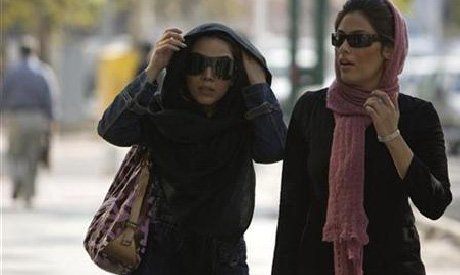
TEHRAN: A draft law that would give greater powers to Iran's police to enforce women's compulsory wearing of the veil has been ruled unconstitutional, state media reported Saturday.
Under Islamic law in force in Iran since the 1979 revolution, women must wear loose clothing, known as hijab, that covers the head and neck and which conceals their hair.
But many now push the boundaries by wearing thin head scarves, tight leggings and fashionable coats rather than a chador, a long and traditional black garment that covers the entire body from head to toe.
This has led to claims from lawmakers and religious leaders that the rules are being skirted and not maintained by morality police whose job is to ensure Islamic dress code is complied with in public places.
The draft law, called the "Plan on Protection of Promoters of Virtue and Vice" was rejected by the country's influential Guardian Council, a 12-member group that scrutinises legislation.
The official IRNA news agency, quoting a council spokesman, said the 24-point plan contained 14 flaws and it "contradicted the constitution and was not approved". The report did not give specifics.
However, the council's decision is not the end of the law, under which lawmakers want to give members of the Basij, a religious volunteer force established by the country's revolutionary leaders, power and protection to verbally caution women they deem improperly dressed.
The council has sent the law back to parliament for amendment, IRNA said.
The wearing of hijab is an emotive issue in the Islamic republic, with supporters saying it is an essential part of Islamic culture for women, but opponents argue that it is an ill-defined legal requirement.
The draft law, which was approved by parliament in December, also aimed to place responsibility on employers to ensure hijab is observed by workers, with companies facing fines for non-compliance.
President Hassan Rouhani, who has been under pressure from hardline lawmakers to pursue a tougher police stand on the veil, distanced himself from the planned law in a speech on October 25.
"We should not be overly focused on one issue, such as bad hijab, to prevent vice," he said.
COMMENTS (4)
Comments are moderated and generally will be posted if they are on-topic and not abusive.
For more information, please see our Comments FAQ































































Iranians are persians and not Arabs,
I was on an Emirates flight from Tehran to Dubai. 99% of the women passengers entered the plane wearing the hijab. Only 1% wore it after take off from Tehran. None wore it after landing at Dubai.
Hijab is compulsory for a woman and its her decision to follow that commandment, but is it compulsory to verbally and physically abuse a woman in to wearing one...? I'm confused?